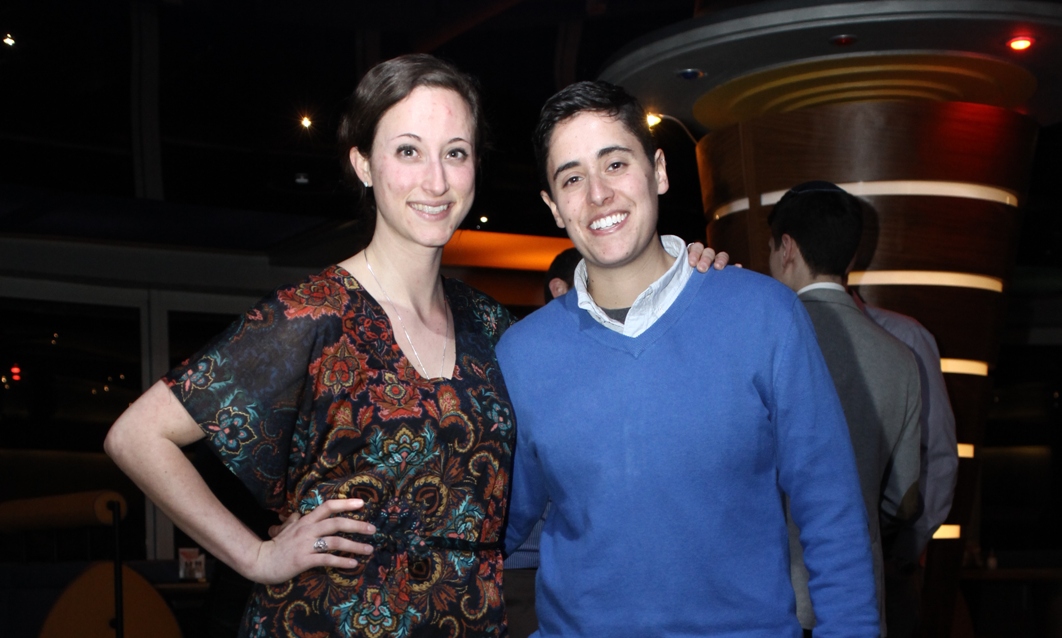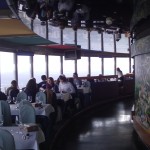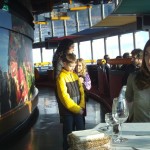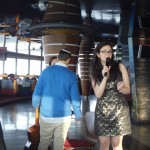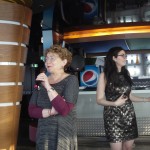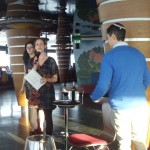Two female rabbis, Rachel Logan and Hilly Haburn, decided to extend their study-tour in Lithuania this year in order to attend several different Passover seders here.
As usual, Vilnius had multiple public seders this year, including the usual Lithuanian Jewish Community seder, the Chabad Lubavitch Center’s seder conducted by Rabbi Krinsky, and the independent seder sponsored and organized annually by Rabbi Feffer. This year, however, Amit Belaitė, the president of the Lithuanian Union of Jewish Students, took things to a new level, literally. Her seder was held high above Vilnius, in the restaurant midway up the Vilnius Television Tower in the Karoliniškės neighborhood of Vilnius.
Belaitė’s luftseder was conducted by the two female rabbis who had been invited to stay on in Vilnius for this purpose, at 6:00 P.M on Sunday, April 5, 2015. On the first night of Passover they had attended the LJC seder, the Rabbi Samuel Jacob Feffer seder and the Chabad Lubavich seder of Rabbi Sholom Krinsky.
“We were made to feel welcome everywhere,” Rabbi Hilly Haburn said. “Nobody made us feel unwelcome.”
Haburn, originally from New York, is living in Jerusalem, along with Rabbi Logan, originally of Boston, where they study at the Hebrew Union College. Their study-tour included a large contingent of students who were not able to stay on for the Passover celebrations.
Celebrants gathered at the base of the tower complex while the sun still lit the landscape brightly. Within several minutes the elevators were ferrying groups of mainly young people in their 20s up to the restaurant concourse. The restaurant is called Paukščių Takas, “Way of the Birds,” an ancient Eurasian name for the Milky Way Galaxy which the Lithuanian language still employs. The restaurant is a lot like the one atop the famous Space Needle in Seattle, except smaller, and the tables are located on a ring which revolves around the tower intermittently, providing a panoramic view of the city and parklands below.
Besides the majority of young people, some of them members of Belaitė’s student organization, there were also members of the local Jewish community, including Faina Kukliansky, chair of the Lithuanian Jewish Community, with two grandchildren. The turnout was significantly larger than had been anticipated and probably came to 50 or 60 people in total.
Lithuanian Jewish Community chair Faina Kukliansky welcomes the audience and tells them this seder will be “a little different” thanks to the two guests from America. “Let’s try it, see what it’s like, and then talk about it,” she said.
Logan and Haburn used a wireless microphone to introduce themselves and welcome the holiday makers. Kukliansky gave a short and poignant address, noting the parallel between the liberation of the Jews from slavery in Egypt and Lithuania’s own liberation several decades ago. Very few of those seated would have made the connection between the venue and Lithuanian independence, they were either too young or from abroad, but on January 11, 1991, tanks had rolled over and fired upon civilian protestors at the base of the TV tower, killing more than a dozen who were gathered there to protect breakaway Lithuania’s media at the most physical level. “Our liberation is not just physical,” Kukliansky said, “but also spiritual, and as we grow in our freedom, we embrace the freedom of others, and give respect to and seek out different religious approaches.”
The seder which followed wasn’t really a radical feminist event, but was very hands-on. Tables were invited to discuss the four questions and to come up with a fifth of their own. The rabbis used a haggadah published on the Velveteen Rabbi’s award-winning blog, which includes this passage:
“The daughter in search of a usable past. Ma hi omeret? What does she say?
“‘Why didn’t the Torah count women among the “600,000 men on foot, aside from children,” who came out of Egypt? And why did Moses say at Sinai, “Go not near a woman,” addressing only men, as if preparation for Revelation was not meant for us, as well?’
“Because she already understands that Jewish memory is essential to our identity, teach her that history is made by those who tell the tale. If Torah did not name and number women, it is up to her to fill the empty spaces of our holy texts.”
Shadows lengthen as a young family arrives
While there wasn’t much overt emphasis on feminist content, those who assembled for the seder consisted mainly of women, many of whom responded positively to what was said and passed around in the photocopied haggadah texts. After the formalities many of the women posed for photographs with the two rabbis to remember the event. Organizer and hostess Amit Belaitė went from table to table making sure all the guests had everything they wanted or needed, and the non-ritual dishes served were upscale-ish: an excellent cream of mushroom bisque, followed by a small portion of baked salmon in sauce with lemon and culminating in a tasty raspberry sorbet-type dessert. The three or four children at the event occupied the time after by running clockwise laps around the restaurant, which didn’t seem to bother the staff or the other visitors at the tower. The two rabbis said they thought the seder had gone well.


